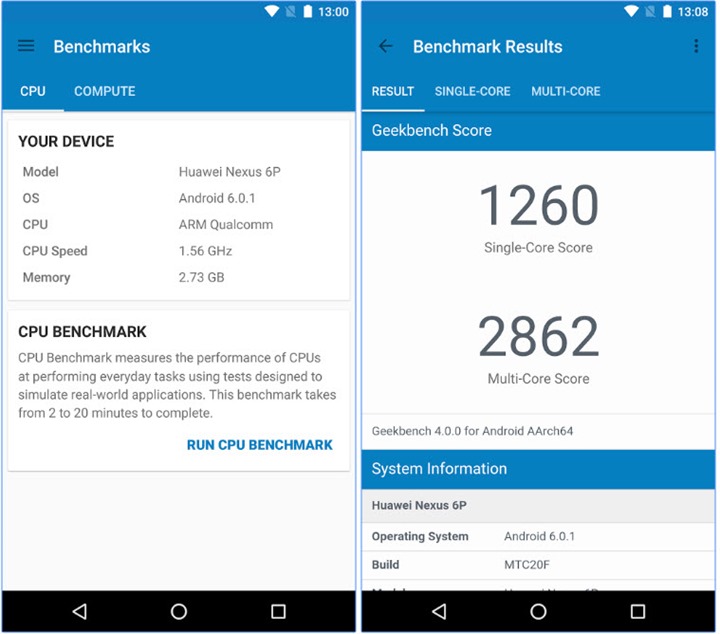Geekbench 4 workload types
Benchmarking tests or workloads are divided into two main types, one is for the CPU and memory, the other is for the GPU.
CPU Benchmark
CPU Benchmark scores are used to evaluate and optimize CPU and memory performance using workloads that include artificial intelligence, data compression, image processing, and physics simulation. Performance on these workloads is important for a wide variety of applications including web browsers, image editors, and developer tools.
Geekbench 4 groups CPU workloads into two sections:
- Single-Core Workloads.
- Multi-Core Workloads.
Geekbench 3.4.2. Released 2017-01-12. Fixed a crash that could occur after transferring the boot drive from one system to another. Fixed a crash that occured when reading malformed or corrupted system information tables. Geekbench 3.4.1. Released 2016-02-12. Geekbench 3.4.1 contains an important security fix for OS X and is recommended for all.
- Geekbench: This is a benchmark of Geekbench 5 Pro. Geekbench 5 Test: GPU OpenCL. OpenBenchmarking.org metrics for this test profile configuration based on 1,212 public results since 14 August 2020 with the latest data as of 20 December 2020.
- New in Geekbench 5.3.0: Geekbench 5.3 features the following changes: Introduce support for Apple Silicon Macs. Geekbench 5.3 is a Universal binary and can now measure the native performance of.
Each section is grouped into four subsections:
- Cryptography Workloads, with 5% weight of the final score.
- Integer Workloads, with 45% weight of the final score.
- Floating-Point Workloads, with 30% weight of the final score.
- Memory Workloads, with 20% weight of the final score.
Geekbench inserts a pause (or gap) between each workload to minimize the effect thermal issues have on workload performance. Without this gap, workloads that appear later in the benchmark would have lower scores than workloads that appear earlier in the benchmark.
The default gap is 2 seconds for both single-core and multi-core workloads.
Compute Benchmark
Compute Benchmark scores are used to evaluate and optimize GPU Compute performance using workloads that include image processing, computational photography, computer vision, and machine learning. Performance in these workloads is important for a wide variety of applications including cameras, image editors, and real-time renderers.
System requirements
Geekbench 4 Sc
To run the Windows version of Geekbench your system needs to have:

- Windows 7 or later.
- Intel Pentium 4 or later.
- 2GB of RAM or more.
Geekbench features
- Simple and easy to use UI.
- A complete set of tests to benchmark the entire system.
- Used by major tech companies such as AMD, ARM, Microsoft and many more.
- Allows the user to easily share the results with others to compare systems.
- Cross-platform software, Geekbench works on Windows, Linux, Mac, iOS, and Android.
Download Geekbench the benchmarking software
Geekbench 4 1 2020
Download Geekbench 4 benchmarking software by clicking the download button on this page. To get the latest version of Geekbench 4 via Downzen, all you have to do is click the download button.
GeekBench is a system benchmark utility that can test CPU and GPU by performing complex and intense processes that check the computing power of the current PC setup.
The application has a simple installation procedure while installs the main program. Once executed, you're faced with a basic user interface that displays the currently installed operating system and processor details such as make, mode, package and speed in the form of base frequency.
The CPU benchmark tool can run in either 32-bit or 64-bit mode and then you can hit the Run CPU Benchmark button to get started on the main function of the program.
Geekbench 4 1 2019
The Compute Benchmark is a tool that will benchmark the power and abilities of the installed graphics adapter. It will perform some basic tasks made for GPU units like image and graphics processing.
Once these tests are completed, you're directed to the Geekbench.com web site which will show you your Single-Core and Multi-Core Score along with Crypto Score, Integer Score, Floating Point Score and Memory Score. It will display how fast your processor or GPU performed things like dealing with JPEGs, AES, Canny, Lua, etc.
Scrolling through the test results should give you an idea of how well the CPU and GPU functioned on the system and the test results can be shared with other users.
Geekbench 4 1 2 Download
All in all, GeekBench performs a number of tests to give users an idea of how well their CPU or GPU performs in different scenarios.
Geekbench 5.3.2 on 32-bit and 64-bit PCs
This download is licensed as shareware for the Windows operating system from benchmark software and can be used as a free trial until the trial period ends (after an unspecified number of days). The Geekbench 5.3.2 demo is available to all software users as a free download with potential restrictions and is not necessarily the full version of this software.Filed under:Geekbench 4 1 2
- Geekbench Download
- Major release: Geekbench 5.3
- CPU Benchmarking Software

